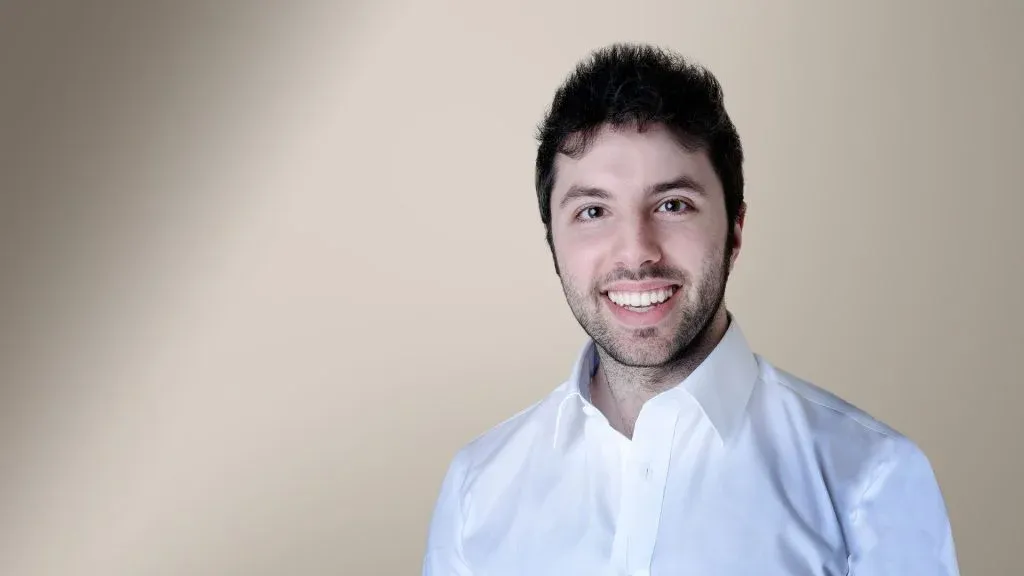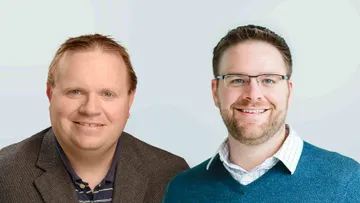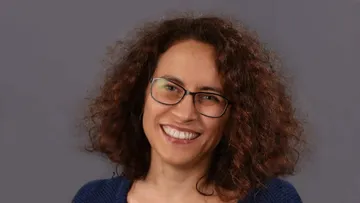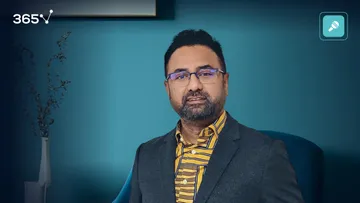Edouard Harris, CEO and Co-founder of SharpestMinds

Hi Edouard, could you briefly introduce yourself to our readers?
Hi. My name is Edouard Harris. I am the co-founder of a company called SharpestMinds. We are a machine learning mentorship program based on income share. The idea is that we are mentors who work with you on a project, train you until you’re ready to be hired, and only once you get hired you pay back for the training that you’re getting.
Sounds like a great option for aspiring data science professionals who are new to the field. Speaking of that, how did you get into data science?
I’m originally a physicist by training and kind of slowly wandered my way into machine learning and data science, as so many people have. You barely find someone who went straight into data science. People kind of bounce around and eventually discover it, and that’s more or less my background. To cut the long story short, I’m from Toronto, and I was a physicist for about 10 years before I eventually went into data science.
That’s quite the career transition! Now – about SharpestMinds – can you tell us how the idea was born, how you got started, and how you met the people who work with you on that exciting project?
Yeah, we started by doing a whole bunch of stupid things that you can expect from someone coming straight out of school wanting to start a company. So, the first thing we did was completely ridiculous. It was like an app to help you find restaurants or something. It was completely insane and outlandish.
Then, we tried various different things, just learning the ropes of starting a company and making it work to actually make money from it. So, the first version of the idea that kind of worked was that more or less we would screen data scientists and then place them at companies. It was sort of a data science recruitment thing. But we asked ourselves:
“Do we want to do this for the next 10 years? Do we want to be recruiters for companies for the next 10 years?”
And we thought, well, there’s a problem with what we’re doing here, because, when you’re charging companies, the company is your customer. And here’s one of the issues with that. Because the student or the applicant isn’t the customer, there were some controversial incentives around. For example, you don’t want to restrict their choices to the companies you have deals with, right? And so, wait, are you working against the people that you want to be working for? So, is this what we’re doing for like a decade? That’s how long it takes to build a big company! And we were like – no. But is there a way to structure this, so that the student is our customer and we answer to them directly, but also, we’re not charging them right upfront? Because when you charge upfront, you end up being driven by sales, whereas we wanted to be driven by the same outcomes that were driving the students. And, so, the structuring of it is a little bit unusual, a little bit hard to explain, a little bit wonky, but the outcome of that is we can work with total abandon for our students.
And that is the thing that we want to do for the next 10 years. Basically, the lesson for us was: structure your company in such a way that makes it possible for you to make money with the thing that you want to do for the next 10 years.
That’s actually a very noble cause you’re working on. And your business idea is very interesting…
Well, the idea in itself is not crazy original. It’s been around for 3-4 years or so, and much longer than that. Apparently, ISAs (Income Share Agreements) are very common in Germany as a way of making a school.
But the idea of scaling it remotely over Internet is a little bit newer. The idea of turning it into your marketplace where individual mentors take this deal, that’s kind of revolutionary. When someone agrees to such proposal, you know they’re really great people, because only a person who’s pretty relationship-driven would dedicate themselves to a project like that. You don’t make money, you are away, you invest in this person, you believe in this person and if your belief is justified and they get a good job, only then you make a profit. It takes a special kind of person who’d really take that deal. When we started it wasn’t clear at all if there was anyone like that in the entire world. It turns out such people are very few.
So, that kind of a marketplace was really like the leap of faith we ended up taking. And that was, as far as we know, the first time this has been done.
Edouard, talking about a leap of faith, was there any case when you decided to sign up a student with absolutely no experience in Python or Machine Learning, or any related background? And if that has happened, did that student succeed in landing a job in data science?
Good question.
Generally speaking, we don’t do that. We are not designed to be, at least not yet, a full school that takes you from “I don’t know anything” to "I have a job". Rather we take people who already know some Python, already know some ML frameworks, who’ve completed a little project on their own. The idea is that you take someone who understands the basics but needs to understand what it takes to actually get a job, like learn best practices. You know, write code that isn’t just for yourself, that is intended to be read and rewritten and understood by other human beings or by yourself 9 months later after you go back to your coding.
It’s about using all these little tools that the industry takes for granted. We give our students those extra little bits to get them into the workforce. The mentors supply the knowledge, we supply the placement stuff, the resume review, and all the rest.
Can you think of a situation where you felt especially proud of a student and what you and your team helped them achieve in their career?
Yes. There’s a story that happened recently I’m really delighted of. It’s about one of our recent hires, a guy that is an inspiration to me.
So, he really wanted to be a data scientist in the fashion industry. And there aren’t a ton of opportunities specifically for data science, specifically in the fashion industry. He got a conversation with the data engineer at that clothing brand. And then he spent 3 weeks obsessively going through their website and the recommender system that you get when you buy something from them. He even bought something from them, and he saw what they recommend, what this looks like, etc. So, this particular brand was doing collaborative filtering as a recommender, but what you actually want as a customer is to complete the outfit. For example, a black t-shirt – what goes with this? What other image is there that goes with it? And he came up with ideas. And we helped him prepare a slideshow presentation, because we thought, “Yes, this is genius! If you’re doing this, we’re totally helping you.”
Finally, he had a meeting where he did the presentation we engineered. He was like, “This is what you need. Look, your competitors are going to do this.” Basically, the company reps didn’t expect anything like it. And the week after that, he obviously saw the newsletter of this fashion company, and it had the complete outfit section on it. They were already testing the idea, and he ended up getting hired.
That’s one of those things that you get when you have someone who’s just not willing to compromise on an outcome.
You see, things get invented and created where you go “Oh my goodness!”. And now, this is the approach that we teach. Of course, not all companies that you do big presentations for, but some companies are special, and some companies are special to you. Sometimes there are once in a lifetime opportunities. So, if you really want to go for it, now we tell our students – we will help you. We’ve seen this, we’ll give you the steps. And this guy was kind enough even to record a webinar to tell the students how he did it, and how he got through all those variants. He was really an inspiration for us as well. In fact, one of our secrets is that we learn a lot from our own students, how well they do, and how well they work, so we can spread the knowledge across.
That’s really great! I suppose that’s also the result of your team’s enthusiasm, and how you approach your students with an open mind.
That’s what it’s all about, yeah.
Edouard, we talked about skills and education. Do you think that there are certain gaps on a college level when it comes to data science? What do you think are the skills that are not taught to students but could actually help them become successful data science professionals?
Well, I had a conversation with a University Professor about 2 weeks ago and I asked him what he teaches and he said, “Actually, I don’t know yet.” He was kidding, of course, but generally speaking, good software engineering practice is lacking in schools. Sometimes, you work as a team in undergrad but the team comes together for the purpose of building one project, showing it to your Professor, and then walking away with a grade. Whereas for real software projects that really contribute to the world, you really need to write code in a way that would be understandable.
That’s the biggest hiring principle that’s missing at universities and is necessary in the workforce. And in grad school, we missed out on this, too. I went to grad school where you’re writing code for yourself, you’re not writing code for other people to read. Even when you publish your code, you don’t really care that other people are going to read it. You just want to get it published.
Thank you for that answer, Edouard. So, would you say that in order to excel in data science, students should focus more on individual projects with real-world data and start a project from scratch rather than on school projects?
Yeah, that’s it. Well, there’s probably a limit to what you can learn on your own. Although there are some individuals that are driven enough so they can do everything just by themselves and just on the internet, and that’s awesome. So, when it comes to individual projects, the advice I very often give is: “Collect your own data.” And there’s a lot of good reasons to do that.
The data that you’re going to collect yourself is going to be pretty terrible in a lot of ways. And data that’s collected in the real world is also pretty terrible. Usually, you’re just taking what you can but the people who are collecting data aren’t world-class experts in collecting data, either. So you learn to work with what you have.
The second thing why collecting your own data helps is that there is a principle of making a project to show off to others that should be a proof of work. And a proof of work isn’t just like “I did a bunch of work”. It’s “I did a bunch of work and you can check that I did a bunch of work without too much effort on your part.” So, yeah, I can write 10,000 lines of code but do you really want to go through and check my 10,000 lines of code to make sure that I did a good job? No.
So, instead, you can use a different tactic. Collect the data yourself in the real world in an interesting and original way.
One person collected data from the shelves in a store in order to detect when an item was missing from the inventory for the store. That’s cool. The detector itself is interesting but it’s not a revolutionary specification. But it’s more like, look this guy cared so much that he actually went there and he looked like a dufus for hours trying to collect that data. He was willing to do all that effort. So, it’s easy for you to say, “This is the kind of crazy that you want to hire at your company.” So, this is my approach.
And, as to the other approaches – just make a really simple interface. So, I can hand my phone to someone to show what you did, and he can check. As simple as that. Make it easy for the person across the table to verify. Employers have been looking at a hundred thousand of resumes, so yours not only has to stand out with what you did, but it has to stand out in an obvious way.
That was some really helpful advice, Edouard. I’m sure our readers will appreciate it. Now, in your opinion, which are the top 3 challenges that beginner data scientists face in their day-to-day professional life?
Three most common challenges for beginner data scientists… Well, there are different types of beginner data scientists. But I’m going to imagine someone fresh out of school.
So, for someone fresh out of school, one of the challenges they face is writing code that will be read by a lot of people, but we’ve already talked about it. A second important one is being able to talk about your results with a business-side person. This kind of collaboration between business and tech doesn’t really happen in university. This is how the real world works, and yet, we’re not trained for this.
So, the ability to build an interface constructively with the other side and understand the problem of the business that is either losing you money or not making you enough of money is crucial.
And the third thing is, often, in very large companies, there are a bunch of cultural norms that an outside person is not familiar with, like, what’s the first thing you do in a meeting at that company? Basically, all of these are a dealing-with-people type of challenges. So, once you’ve got the technical training, you should reframe your mind, so that you can deal with other human beings constructively to build a productive enterprise, together. And that’s hard. It’s very hard to get large groups of people all rowing together in the same way. And it’s even harder when you’re just joining and you have no idea of the cultural norms and the consequences of mistakes that are easy to make early on.
Do you prepare your students to overcome those challenges at SharpestMinds?
Yeah. One of the advantages of the way we’re structured is that the instructions are provided by mentors who are actively working inside these companies. And, that’s the exact problem of the Professor who doesn’t know it yet. I apologize to that guy for bringing him up a couple of times here. But, anyway, if you have someone who’s been pretty far in the academic world, the problem with the academic world is that it’s kind of insulated from everything else. So, the people who are teaching you have not themselves been directly in contact with the real world.
And this is one of the problems that perpetuates on. Whereas, we want you to learn from people who can say “I’m working in the real world right now. I just got home from my job and here are the problems that we faced one hour ago, and here’s how you can make sure that you are not resourceless when you come across such problems at work.” This is what’s super important – having individuals that are in contact with the real world all the time.
Edouard, as a final question, would you like to give a piece of advice to the kind of people who want to transition from a totally different career into data science? You’ve experienced it already, so what tips would you give them?
It depends a lot on the career, but the broadest useful advice is: leverage your domain knowledge.
So, if you’ve already done some finance, leverage your knowledge in finance. Don’t erase your past. Don’t be like “Oh, I was in finance but not anymore.” No, no, no.
You want to be like, “Yeah, I was in finance. I was goddamn good at it and I worked on x, y, and z when I was in finance. And now, look at how I’m applying x, y, and z in interesting and clever ways as appointed to this instance.”
Essentially, you want to tell a story and also create a narrative about yourself. And the narrative you create about yourself when you transition is not “Oh, I’m changing everything about myself.” It’s more like, “No. I’m moving away to even further increase the value of the experience that I already have.” And too many people who want to make that transition are in a way embarrassed. But that’s the wrong way to look at it. You have to look at it as “I used to be this and I was awesome at it. This makes me even more awesome because now I have this amazing skill set and knowledge and also all of these tools available to me that make me even more of that.”
And one last thing. The only certain way to fail is to give up. And I’ve seen people that I’m sure are definitely getting a job. But for various reasons they don’t believe in themselves. And, sometimes life happens when you have to just make ends meet - that’s the way life is… But usually, success is just one notch above the level where you’re discouraged enough to give up. So, yes, there’s a wall but you can break through the wall if you push further.




